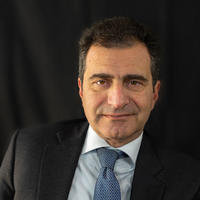
Jad Melki
Jad Melki, Ph.D., is associate professor of the journalism and media studies and chairperson of the Department of Communication Arts at the Lebanese American University (LAU), where he also directs the Institute of Media Research and Training. Melki is also a visiting faculty at the Salzburg Academy and an affiliated researcher with ICMPA at the University of Maryland, College Park. His research is at the intersection of digital media literacy, journalism, war, and gender studies, and focuses on Arab media education. Previously, Melki was founding Director of Media Studies at the American University of Beirut (AUB) and has taught at the University of Maryland, Johns Hopkins, and Towson University. In 2015, he won the UNESCO-UNAoC International Media and Information Literacy Award for advancing media literacy education in the Arab region through founding the Media and Digital Literacy Academy of Beirut (MDLAB). As a former broadcast and digital journalist, Melki was part of a team that won a Webby Award and a National Press Club Award for covering the 2006 Lebanon-Israel war. He received his Ph.D. from the Philip Merrill College of Journalism at the University of Maryland, College Park.
less
Related Authors
Sarah Pink
Monash University
Andrea Peto
Central European University
Remo Caponi
University of Cologne
Armando Marques-Guedes
UNL - New University of Lisbon
Martin O'Neill
University of York
Stephen Whittle
Manchester Metropolitan University
Nicola Lupo
LUISS Guido Carli
Karen Barad
University of California, Santa Cruz
Paola Bacchetta
University of California, Berkeley
Ruben Apressyan
The Institute of Philosophy of the Russian Academy of Sciences










Uploads
Papers by Jad Melki
specific familiarity with recent Dubai headlines. Results indicated that Dubai has experienced tremendous growth in global media coverage. News media served as a source of substantial but varying importance to the surveyed professionals. Participants from all three cities held Dubai images consistent with prominent newspaper headlines about the city. The fi findings discourage the use of aggregated global data for marketing decisions and tempers assumed universality of Dubai ’s image. It urges tying specifi c media channels to the location of the target audience and using former visitors of a place as effective information sources.